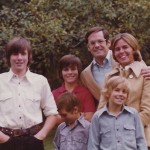Spending the summer in Scotland, I think often of my mother-in-law, Clare. She was a funny,  feisty, kind, loving woman, who immigrated to the U. S. from Scotland shortly before my wife was born. She became a second mother to me after my own died too young. In the seven years since she left us, I still miss Clare greatly. I am reminded of daily of her here, when I hear the Scottish accent and the familiar expressions she used (most frequently, to me, “Don’t be daft, laddie!”), and visit her home town, Glasgow.
feisty, kind, loving woman, who immigrated to the U. S. from Scotland shortly before my wife was born. She became a second mother to me after my own died too young. In the seven years since she left us, I still miss Clare greatly. I am reminded of daily of her here, when I hear the Scottish accent and the familiar expressions she used (most frequently, to me, “Don’t be daft, laddie!”), and visit her home town, Glasgow.
So I am delighted to post this guest blog by the wonderful Lee Woodruff, who writes eloquently about family and many other issues (check out Lee’s blog here). She beautifully sums up the wisdom she learned from her mother-in-law – it’s really a tribute to mothers-in-law everywhere.
What I Learned from My Mother-in-Law, by Lee Woodruff
These are some of the things I know to be true about my mother-in law:
- She believed without a doubt that her four sons were perfect. And even if they weren’t, she never said otherwise in public.
- She taught me to set up the coffee maker in the evening so all you had to do was push a button in the morning.
- The definition of a 1950’s era lady, she wore her Revlon Moonrise Pink lipstick at all times. Like most of us, she was never fully satisfied with her hairdo.
- Her signature saying, “It only takes a minute,” applied as equally to doing four loads of laundry or whipping up a steak dinner, as it did to driving from Detroit to New York to visit her grandchildren.
- It was her personal philosophy to never say a bad word publically about other people.
- Homemade chocolate chip cookies were her calling card. They had verifiable magic powers to change the course of an illness, heal a broken heart, brighten up a new home, refresh a friendship, thank people, wish a Merry Christmas or just simply say “hi.” To know Frannie Woodruff was to have eaten one of her ultra thin and crispy chocolate chips, the secret of which she liberally shared — extra butter and cake flour.
- She was an early convert to “transition” glasses, which meant her Jackie-O size lenses were usually a shade of dark purple, even when indoors. Although her sons teased her, I now realize it was a clever way to have “eyes in the back of her head.”
- No matter what she ordered at a restaurant (usually Fettuccine Alfredo), when it came, 90% of the time, before she even tasted it, she remarked that she should have ordered what we did.
- I’ve tried to imagine all the places she went in the pairs of white and black formal gloves that she gave to my daughters for dress-up, including one elegant opera length kid leather pair smelling faintly of smoke.
- She knew bank tellers, grocery clerks, pharmacists, hairdressers, T.J. Maxx employees and just about everyone else by their first names.
- Raising four boys in the 70’s who played every sport imaginable, she inexplicably cooked only one package of frozen corn at dinner, causing them to develop a lifelong habit of eating too fast.
- She knew the names of every one of our neighbors in all of the cities we ever lived and kept up with some of them—adding them to her Christmas card list– long after we’d moved.
- She worshipped butter, whole milk, and cream sauces. Her sister Lynnie bought a framed poster of a stick of butter and Frannie coveted it so much that she dragged Lynn to every Homegoods store in the greater Detroit metro area looking for its duplicate. In the end—they agreed to share it.
- She could not have told you what NPR stood for and did not listen to it.
- She danced the Charleston like she had rubber bands for legs and enthusiastically taught my children how.
- She was an avid reader of mass-market fiction. We both shared a secret love of Sidney Sheldon.
- Bob and I moved to nine places in 25 years of marriage (seven were domestic) and she was physically there for all seven. In each house she would unfailing set up the kitchen (my version of plunging toilets after an intestinal virus) and unpack boxes with me from dawn until long after the kids went to bed. I always gave up first.
- She was such an enthusiastic and regular patron of TJ Maxx and Marshalls that on her 70thbirthday, her local store had a nametag made for her.
- She never spent a second worrying that she needed to fulfill herself, find her passion or broaden her horizons, and she could not have accurately defined the word “feminist.” She was 100% happy being a wife, mother and the “World’s Best Grandma,” although she never would have worn the T-shirt out of the house.
- Never once in my presence was she able to work the TV controller, program the VCR or operate the cable box. She did, however, have a grasp on the volume button.
- She set a gold standard, real life example of the word “devotion.” Watching her move through the world, I learned many important things that go into the secret sauce of being a wife, mother and good girlfriend — not just in the placid times, but when the going gets choppy.
- She taught me you could drive a car with your left leg up on the console, a coffee cup balanced on the dashboard and the seat belt alarm circumvented by clever buckling.
- She was the oldest sister of three girls (like me) and two brothers. Watching her interact with her siblings was my preview for how that bond would further strengthen, long after the kids are grown and flown.
- The famous story of Frannie — one Pappagallo shoe on the flank of their black lab as she extruded a long stream of black plastic garbage bag out of the dog’s butt (he had escaped and eaten a neighbor’s garbage AND the bag) — became an iconic metaphor in our house for some event, issue or what-have-you that just won’t end.
- Her cornflower blue eyes and signature dark “Dawson” brows and lashes were passed on to her lucky, lucky boys. (Why is it always the boys who get this gene?)
- She was fortunate enough to die exactly the way she would have wanted — in her own home, in her own bed, surrounded by her devoted husband and her beloved boys, and the repeated assurances (not that she needed them) that she was the most loved, most wonderful Mom in the world. And she was.
Rest in Peace Frances Dawson Woodruff – 1933 — 2013
Follow Lee Woodruff on Twitter: @LeeMWoodruff
Check out Lee’s website: http://leewoodruff.com/





